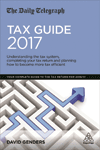
Writing a practical yet concise guide to UK tax is a big challenge. But The Daily Telegraph Tax Guide 2017 by David Genders (Kogan Page, £14.99 – buy on Amazon) does a good job of covering everything from the basics of calculating and paying your tax bill to pensions and inheritance tax. So it’s an ideal one-stop source of advice for most of the problems that you are likely to face. Genders provides plenty of advice on how to keep your tax bill as low as possible: almost every page contains a tax-saving tip. So if your affairs are relatively straightforward, or you want a reference work that covers a wide range of areas, then we’d recommend this – although be warned that it may become dated relatively quickly as subsequent budgets change the regulations.
If you require more in-depth coverage, we’d suggest pairing this with a more detailed text focusing on the area that you are particularly concerned about. There are a number of specialists producing books covering almost every area of tax, one of which is Taxcafe, publishers of Pension Magic 2016/2017 by Nick Braun (Taxcafe, £24.95 – buy on Amazon). As the name suggests, this focuses on pensions, Isas and how you can use the tax perks in the pension system to your advantage. Braun is a big fan of increasing pension contributions, arguing that it would be foolish not to take advantage of the large tax subsidies that still exist. So he provides in-depth guidance to tricks such as salary sacrifice: the practice of swapping a higher salary for increased employer pension contributions, which can bring tax benefits for both you and your employer.
Inheritance tax is another important area of tax planning. However, as Steve Parnham, the author of The Absolute Essence of Inheritance Tax Planning (CreateSpace, £5.99 – buy on Amazon), points out, most books on this topic devote most of their space to explaining the law as it stands, and relatively little to giving practical advice. He adopts the opposite approach, explaining some general principles that should stand you in good stead even if major changes take place in the future, as they almost certainly will. Since most people with large estates will need professional tax advice anyway, this makes a lot of sense. The book is self-published on Amazon’s platform and isn’t particularly visually appealing, but for those prepared to look beyond the rough and ready layout, this is an extremely useful introduction.
Working out how to order your affairs in the most-tax efficient way possible can help save you money. However, it’s also useful to understand why we pay taxes in the first place and how the overall system works. What Everyone Needs to Know About Tax, by tax expert James Hannam (Wiley, £19.99 – buy on Amazon), aims to provide some wider context.
The book looks at the various types of taxes on income, spending, property and business, explaining the rationale behind the current system as well as the pros and cons from an economic viewpoint. But Hannam also provides some policy ideas on how the tax system could be reformed to make it more efficient. Tax policy tends to attract either libertarians who figure that all taxation is organised theft, or those on the opposite end of the political spectrum who’d like to increase it. However, Hannam tries to steer a middle course. While he is clearly sympathetic to calls for lower, simpler tax rates, he acknowledges that many left-wing critics of the system have a point, especially when it comes to tax avoidance by larger companies. Similarly, he is willing to defend some parts of the system that are often controversial, such as the apparent tax breaks on gains from spread betting, that he considers to be economically justified.
Of course, there are parts of the book that many people will disagree with. For example, the author’s defence of the special status that non-doms (people resident in the UK who are considered to have their permanent homes elsewhere) enjoy overestimates their mobility. Similarly, his idea for a minimum income tax on the wealthy could end up with the main tax system becoming filled with loopholes, as has happened in America. Still, even in these cases his arguments are based on pragmatism, not ideology. Overall, this is a readable and intelligently argued explanation of why our tax system is the way it is and how it could be improved.